|
-C-
Camel - "Camel" (MCA 1973)
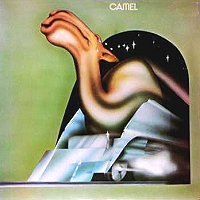 Camel was one of the best British progressive rock bands in the mid-70's. Their sound was strongly dominated by Andy Latimer's guitar/vocals/flute and Peter Bardens' tasteful keyboards. Their self-titled debut was a quite rough and unpolished product, but it still featured the two first classic Camel-tracks with the beautiful "Mystic Queen" and the catchy "Never Let Go". Both tracks demonstrated the group's ability to write very strong vocal-melodies combined with lengthy and tasty instrumental-passages. "Never Let Go" also featured one of the few examples recorded of a mellotron-solo. "Separation" and the opener "Slow Yourself Down" are both harder rock tracks where the latter one is the most complex and progressive, featuring some excellent solos from Latimer and Bardens. There are also two pure instrumental-numbers here with the jazzy "Six Ate" and the energetic "Arubaluba". The energy on the latter one may sounds a bit forced, but it still demonstrated well what a tight unit Camel were. Overall, a promising, exciting and interesting debut. Camel was one of the best British progressive rock bands in the mid-70's. Their sound was strongly dominated by Andy Latimer's guitar/vocals/flute and Peter Bardens' tasteful keyboards. Their self-titled debut was a quite rough and unpolished product, but it still featured the two first classic Camel-tracks with the beautiful "Mystic Queen" and the catchy "Never Let Go". Both tracks demonstrated the group's ability to write very strong vocal-melodies combined with lengthy and tasty instrumental-passages. "Never Let Go" also featured one of the few examples recorded of a mellotron-solo. "Separation" and the opener "Slow Yourself Down" are both harder rock tracks where the latter one is the most complex and progressive, featuring some excellent solos from Latimer and Bardens. There are also two pure instrumental-numbers here with the jazzy "Six Ate" and the energetic "Arubaluba". The energy on the latter one may sounds a bit forced, but it still demonstrated well what a tight unit Camel were. Overall, a promising, exciting and interesting debut.
Label
Camel - "Mirage" (Deram 1974)
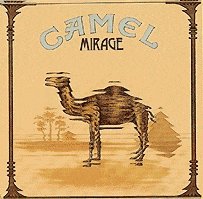 "Mirage" pretty much perfected the style of the debut-album with a richer, more varied sound and overall stronger material. Latimer had now also found his flute, and delivered one of Camel's best flute-based pieces in "Supertwister". The track also showed that Bardens used el-piano in a far more intelligent and tasty way than most others who used that instrument. But the centrepiece and highlight of the album was still the 12-minute "Lady Fantasy Suite". A masterful song with lots of breaks, strong riffs and melodies and a very impressive and powerful performance from the whole band. The album also featured another suite in form of the 9-minute "Nimrodel" with lyrics inspired by Tolkien's "Lord of the Rings". "Earthrise" was possibly the hardest rocking and most energetic instrumental-number they ever did, and featured some of Bardens' best playing ever. The opener "Freefall" was also some kind of a hard rocker, but this one had also the same jazzy sound as "Earthrise", giving it some kind of sophistication. "Mirage" is a great album, and undoubtedly one of Camel's best. "Mirage" pretty much perfected the style of the debut-album with a richer, more varied sound and overall stronger material. Latimer had now also found his flute, and delivered one of Camel's best flute-based pieces in "Supertwister". The track also showed that Bardens used el-piano in a far more intelligent and tasty way than most others who used that instrument. But the centrepiece and highlight of the album was still the 12-minute "Lady Fantasy Suite". A masterful song with lots of breaks, strong riffs and melodies and a very impressive and powerful performance from the whole band. The album also featured another suite in form of the 9-minute "Nimrodel" with lyrics inspired by Tolkien's "Lord of the Rings". "Earthrise" was possibly the hardest rocking and most energetic instrumental-number they ever did, and featured some of Bardens' best playing ever. The opener "Freefall" was also some kind of a hard rocker, but this one had also the same jazzy sound as "Earthrise", giving it some kind of sophistication. "Mirage" is a great album, and undoubtedly one of Camel's best.
Camel - "The Snow Goose" (Decca 1975)
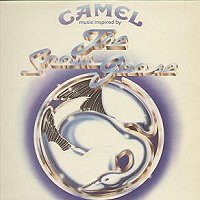 "The Snow Goose" was an instrumental concept-album based on Paul Gallico's book of the same name, and is often regarded as Camel's finest moment. The sound of the album was far more symphonic, polished and atmospheric than anything on their two first albums and featured some of their strongest melodies and themes ever. A few passages also included some orchestration, giving a very big and impressive sound. Many of the tracks on the album are rather short (there were 16 of them!) but all of them floats into one another and creates a 45-minutes constant flow of music. The album opens with the lush, symphonic sounds of "The Great Marsh" and moves then over into "Rhayader" that next to "Supertwister" stands as the best flute-theme Latimer ever wrote. The more complex "Rhayader Goes to Town" demonstrated the instrumental abilities of all the members very well, even if Latimer and Bardens remained the main musicians. "Fritha" and "Rhayader Alone" showed Latimer from his most beautiful and utterly atmospheric side, while the title-track showed his melodic guitar-playing from its best side. As I said, this is an instrumental album but "Migration" does in fact feature some vocals but there are no lyrics, just a very catchy vocal-theme sung by Latimer. Side 2 opens with the cheerful "Flight of the Snow Goose" that quickly goes into the more free-floating "Preparation" that makes some truly haunting atmospheres. "Dunkirk" is orchestrated progressive rock at its most powerful and majestic, building slowly up to an energetic finale. Then come some short and atmospheric interludes again before "La Princesse Perdue" that re-visits several earlier themes of the album. And at last, the whole album slows gently down and returns to the opening "The Great Marsh" that is slowly faded out and marked the ending of one of progressive rock's most memorable and successful instrumental albums. Very essential stuff! "The Snow Goose" was an instrumental concept-album based on Paul Gallico's book of the same name, and is often regarded as Camel's finest moment. The sound of the album was far more symphonic, polished and atmospheric than anything on their two first albums and featured some of their strongest melodies and themes ever. A few passages also included some orchestration, giving a very big and impressive sound. Many of the tracks on the album are rather short (there were 16 of them!) but all of them floats into one another and creates a 45-minutes constant flow of music. The album opens with the lush, symphonic sounds of "The Great Marsh" and moves then over into "Rhayader" that next to "Supertwister" stands as the best flute-theme Latimer ever wrote. The more complex "Rhayader Goes to Town" demonstrated the instrumental abilities of all the members very well, even if Latimer and Bardens remained the main musicians. "Fritha" and "Rhayader Alone" showed Latimer from his most beautiful and utterly atmospheric side, while the title-track showed his melodic guitar-playing from its best side. As I said, this is an instrumental album but "Migration" does in fact feature some vocals but there are no lyrics, just a very catchy vocal-theme sung by Latimer. Side 2 opens with the cheerful "Flight of the Snow Goose" that quickly goes into the more free-floating "Preparation" that makes some truly haunting atmospheres. "Dunkirk" is orchestrated progressive rock at its most powerful and majestic, building slowly up to an energetic finale. Then come some short and atmospheric interludes again before "La Princesse Perdue" that re-visits several earlier themes of the album. And at last, the whole album slows gently down and returns to the opening "The Great Marsh" that is slowly faded out and marked the ending of one of progressive rock's most memorable and successful instrumental albums. Very essential stuff!
Label
Camel - "Moonmadness" (Decca 1976)
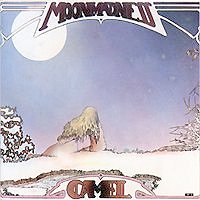 Camel returned to vocals again on their 4th album "Moonmadness". Just like "The Snow Goose" it was one of their very best ones, demonstrating the distinctive Camel-sound and their strongly melodic symphonic progressive rock at its absolutely best. The album opened with the short, keyboard-based piece "Aristillus" that allowed Bardens to show his unique keyboard-style to full effect. "Song Within a Song" is as the title says basically two songs. The first part of it is a very relaxed and atmospheric vocal-part where the flute and el-piano builds perfectly up around Latimer's pleasant voice. The second part is an excellent instrumental piece with lots of Latimer's and Bardens' superb playing. "Chord Change" is a very typical Camel-instrumental in the jazzier vein with strong riffs relieved by more free-floating parts. "Spirit of the Waters" is a short vocal-piece with the most wonderful melody you can imagine, and a very atmospheric and mystical twist on Latimer's voice. "Another Night" is another excellent song although in a more commercial way, even if it's 7 minutes long. "Air Born" is simply Camel at their most touchingly beautiful, melodic and symphonic. Probably my favourite track on the whole album. The closing-number "Lunar Sea" is a lengthy and impressive instrumental where Bardens delivers lots of spacey atmospheres on his keyboards. "Moonmadness" was yet another classic album from Camel. Camel returned to vocals again on their 4th album "Moonmadness". Just like "The Snow Goose" it was one of their very best ones, demonstrating the distinctive Camel-sound and their strongly melodic symphonic progressive rock at its absolutely best. The album opened with the short, keyboard-based piece "Aristillus" that allowed Bardens to show his unique keyboard-style to full effect. "Song Within a Song" is as the title says basically two songs. The first part of it is a very relaxed and atmospheric vocal-part where the flute and el-piano builds perfectly up around Latimer's pleasant voice. The second part is an excellent instrumental piece with lots of Latimer's and Bardens' superb playing. "Chord Change" is a very typical Camel-instrumental in the jazzier vein with strong riffs relieved by more free-floating parts. "Spirit of the Waters" is a short vocal-piece with the most wonderful melody you can imagine, and a very atmospheric and mystical twist on Latimer's voice. "Another Night" is another excellent song although in a more commercial way, even if it's 7 minutes long. "Air Born" is simply Camel at their most touchingly beautiful, melodic and symphonic. Probably my favourite track on the whole album. The closing-number "Lunar Sea" is a lengthy and impressive instrumental where Bardens delivers lots of spacey atmospheres on his keyboards. "Moonmadness" was yet another classic album from Camel.
Camel - "Rain Dances" (Decca 1977)
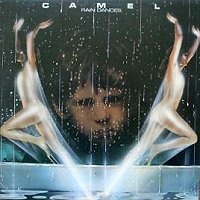 Doug Ferguson left Camel after "Moonmadness", and marked the ending of the first version of the band. He was replaced by none other than Richard Sinclair, who was one of the key-figures in the Canterbury genre of progressive rock. Another new feature in the band was the saxophone and flute of Mel Collins, who first was only a guest musician on "Rain Dances". Sinclair's influence on the band was felt immediately. Not only did he sing on three of the four songs with vocals, but the music had also taken a turn toward a jazzier and less symphonic side than before. But the key-elements of the classic Camel-sound was still in place, and personally I rate "Rain Dances" as their last classic 70's album. The instrumental opener "First Light" is one of the finest themes the band wrote, and Collin's saxophone fits well into the sound. "Metrognome" starts as a light and poppy song dominated by Sinclair's characteristic voice, but turns quickly into complex instrumental passages with some superb guitar work from Latimer. "Tell Me" is an atmospheric and beautiful song full of delicious flute from Collins. However, "Highways of the Sun" was a terrible mistake. OK, so the band was probably under a lot of pressure from Decca to make a hit-song, but that's still no excuse for making it as bad as this. Fortunately, the rest of the album is more than good enough to make it forgivable. The second side starts with one of the definitive highlights in form of "Unevensong". It starts as a quirky and catchy song that leads into more complex instrumental parts before finally stabilizing itself into a melodic theme of the classic Camel kind. The rest of the album is entirely instrumental, and continues with the urban and jazzy "One of These Early Days I'll get an Early Night" that showed a new side of the band. "Elke" featured a guest appearance by Brian Eno, and that meant of course lots of atmospheric and spacey synths. "Skylines" is in a similar style to "Lunar Sea" from the previous album, and the record closes with the short and really beautiful title-track. Doug Ferguson left Camel after "Moonmadness", and marked the ending of the first version of the band. He was replaced by none other than Richard Sinclair, who was one of the key-figures in the Canterbury genre of progressive rock. Another new feature in the band was the saxophone and flute of Mel Collins, who first was only a guest musician on "Rain Dances". Sinclair's influence on the band was felt immediately. Not only did he sing on three of the four songs with vocals, but the music had also taken a turn toward a jazzier and less symphonic side than before. But the key-elements of the classic Camel-sound was still in place, and personally I rate "Rain Dances" as their last classic 70's album. The instrumental opener "First Light" is one of the finest themes the band wrote, and Collin's saxophone fits well into the sound. "Metrognome" starts as a light and poppy song dominated by Sinclair's characteristic voice, but turns quickly into complex instrumental passages with some superb guitar work from Latimer. "Tell Me" is an atmospheric and beautiful song full of delicious flute from Collins. However, "Highways of the Sun" was a terrible mistake. OK, so the band was probably under a lot of pressure from Decca to make a hit-song, but that's still no excuse for making it as bad as this. Fortunately, the rest of the album is more than good enough to make it forgivable. The second side starts with one of the definitive highlights in form of "Unevensong". It starts as a quirky and catchy song that leads into more complex instrumental parts before finally stabilizing itself into a melodic theme of the classic Camel kind. The rest of the album is entirely instrumental, and continues with the urban and jazzy "One of These Early Days I'll get an Early Night" that showed a new side of the band. "Elke" featured a guest appearance by Brian Eno, and that meant of course lots of atmospheric and spacey synths. "Skylines" is in a similar style to "Lunar Sea" from the previous album, and the record closes with the short and really beautiful title-track.
Camel - "A Live Record" (Decca 1978)
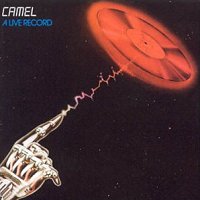 Camel's double live album is a little bit patchy as the first record in the set featured recordings from the tour for "Rain Dances" in 1977/78, while the second record consisted of the band's performance of "The Snow Goose" in Royal Albert Hall nearly three years earlier. The album opens with "Never Let Go" that sounds completely different from the original version from the debut. This one is a lot jazzier and is probably how it would have sounded if it had been written and recorded for "Rain Dances". Definitively interesting, although it's no substitute for the superior original. "Song Within a Song" and "Lunar Sea" are performed very similar to the studio-versions, despite the inclusion of Collin's (who now was a permanent member of the band) saxophone. "Ligging at Louis'" is a good jam that wasn't to be found on any of their other albums. "Lady Fantasy" sounds in my opinion unfortunately rather tame and a bit uninspired compared to the much more powerful studio-version. Then we go a few years back in time to hear the band perform the then brand new "The Snow Goose". It's overall a good performance with a few interesting differences from the original, such as the additional solo on "Migration" and the theme on "Flight of the Snow Goose" being played on organ instead of synths. "A Live Record" is overall an acceptable document of Camel live in the 70's, although I've heard more exciting and interesting live albums than this. Camel's double live album is a little bit patchy as the first record in the set featured recordings from the tour for "Rain Dances" in 1977/78, while the second record consisted of the band's performance of "The Snow Goose" in Royal Albert Hall nearly three years earlier. The album opens with "Never Let Go" that sounds completely different from the original version from the debut. This one is a lot jazzier and is probably how it would have sounded if it had been written and recorded for "Rain Dances". Definitively interesting, although it's no substitute for the superior original. "Song Within a Song" and "Lunar Sea" are performed very similar to the studio-versions, despite the inclusion of Collin's (who now was a permanent member of the band) saxophone. "Ligging at Louis'" is a good jam that wasn't to be found on any of their other albums. "Lady Fantasy" sounds in my opinion unfortunately rather tame and a bit uninspired compared to the much more powerful studio-version. Then we go a few years back in time to hear the band perform the then brand new "The Snow Goose". It's overall a good performance with a few interesting differences from the original, such as the additional solo on "Migration" and the theme on "Flight of the Snow Goose" being played on organ instead of synths. "A Live Record" is overall an acceptable document of Camel live in the 70's, although I've heard more exciting and interesting live albums than this.
Camel - "Breathless" (Decca 1978)
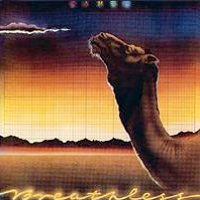 "Breathless" would turn out to be Sinclair's final album with Camel, but he could have finished his time with the band in a better way than this. Many people who usually don't like Camel or progressive rock are often regarding this as Camel's best work. I guess that should be reason enough to be sceptical, and sure enough, "Breathless" had many signs of a band who tried to sell out and keep up with the changing trends. Sure, "Rain Dances" also had some lighter and more pop-oriented tendencies, but they're taken way too far here. But it wouldn't be fair to write "Breathless" completely off, as it also features a few slices of good Camel. "Echoes" is easily the best and most progressive track on the album, featuring lots of Bardens' great keyboard-work and powerful riffs from Latimer. "The Sleeper" is a decent jazzy instrumental, and "Down on the Farm" is a charming little tune about the farm-life. The rest of the album consists of well-performed and kind of sophisticated late 70's pop/rock but still boring anyway, with the dreadful disco of "You Make Me Smile" as the definitive low-point. The highlights are too few to make this album worthwhile. Unfortunately, also Bardens would leave the band after "Breathless", and Camel could never be the same again.
"Breathless" would turn out to be Sinclair's final album with Camel, but he could have finished his time with the band in a better way than this. Many people who usually don't like Camel or progressive rock are often regarding this as Camel's best work. I guess that should be reason enough to be sceptical, and sure enough, "Breathless" had many signs of a band who tried to sell out and keep up with the changing trends. Sure, "Rain Dances" also had some lighter and more pop-oriented tendencies, but they're taken way too far here. But it wouldn't be fair to write "Breathless" completely off, as it also features a few slices of good Camel. "Echoes" is easily the best and most progressive track on the album, featuring lots of Bardens' great keyboard-work and powerful riffs from Latimer. "The Sleeper" is a decent jazzy instrumental, and "Down on the Farm" is a charming little tune about the farm-life. The rest of the album consists of well-performed and kind of sophisticated late 70's pop/rock but still boring anyway, with the dreadful disco of "You Make Me Smile" as the definitive low-point. The highlights are too few to make this album worthwhile. Unfortunately, also Bardens would leave the band after "Breathless", and Camel could never be the same again.
Camel - "I Can See Your House From Here" (Decca 1979)
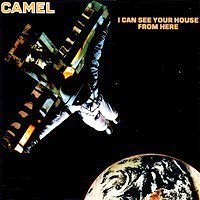 The disappearance of Peter Bardens robbed the band for one of their musical key-figures. But he was replaced by former Happy the Man member Kit Watkins, and the band released their final and undoubtedly worst 70's album. "I Can See Your House From Here" revealed that the new line-up had no clue about what musical direction they wanted to go into. Only two of the nine tracks on the album are classic Camel: "Hymn to Her" and the emotional instrumental "Ice" where Latimer delivered some of his best guitar-work ever. The rest of the album is a directionless turkey of New Wave, soft-rock, stadium-pop and disco, everything drenched in the ugly stench of sell-out. And the criminally horrendous "Remote Romance" is the absolutely worst Camel-song I've heard so far. Nothing could save this artistic disaster, and Watkins was out of the band shortly after the release of the record. Avoid this one, or borrow it from someone so you at least can get a chance to hear "Hymn to Her" and especially "Ice". The disappearance of Peter Bardens robbed the band for one of their musical key-figures. But he was replaced by former Happy the Man member Kit Watkins, and the band released their final and undoubtedly worst 70's album. "I Can See Your House From Here" revealed that the new line-up had no clue about what musical direction they wanted to go into. Only two of the nine tracks on the album are classic Camel: "Hymn to Her" and the emotional instrumental "Ice" where Latimer delivered some of his best guitar-work ever. The rest of the album is a directionless turkey of New Wave, soft-rock, stadium-pop and disco, everything drenched in the ugly stench of sell-out. And the criminally horrendous "Remote Romance" is the absolutely worst Camel-song I've heard so far. Nothing could save this artistic disaster, and Watkins was out of the band shortly after the release of the record. Avoid this one, or borrow it from someone so you at least can get a chance to hear "Hymn to Her" and especially "Ice".
Camel - "Nude" (Decca 1981)
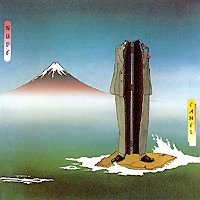 A new decade and yet a new keyboard-player in Camel, this time named Duncan Mackay. And just when you thought that Camel had joined the other major progressive rock bands of the 70's in a hopeless search for a commercial and pop-oriented style, they returned with their best, most symphonic and progressive work since "Moonmadness". And they did it at a time when absolutely nobody had expected it. "Nude" was even a concept-album, and told the true story of a stranded Japanese soldier who stayed in the jungle for 29 years without knowing that the war had ended. The album didn't open all that promising with the boring and generic AOR of "City Life" but the record never lets down after that. "Drafted" is stuffed with great melodies and guitar-themes of the classic Camel-kind, and proved beyond any doubt that the band was back at their best. Then you're in for a series of lengthy and complex instrumental-passages (about 70% of the album is instrumental) that perfectly captures the drama and atmosphere of the story. "The Snow Goose" is the only other Camel-album that can rival "Nude" when it comes to sweeping, symphonic and atmospheric soundscapes. There's lots of flute on the quiet parts, and there are even some ethnic rhythms on "Changing Places" to illustrate the jungle. "Reflection" is Latimer at his most magic, and will again make you think of the most beautiful and relaxed parts from "The Snow Goose". "Lies" is a strong vocal-track that somewhat resembles Pink Floyd, and Mackay delivered an organ-solo to prove that he understood what keyboards a progressive rock band should use, even in the 80's. But no matter how good "Nude" was, it proved to be only a temporarily return to form, as the rest of Camel's 80's output is forgettable crap. A new decade and yet a new keyboard-player in Camel, this time named Duncan Mackay. And just when you thought that Camel had joined the other major progressive rock bands of the 70's in a hopeless search for a commercial and pop-oriented style, they returned with their best, most symphonic and progressive work since "Moonmadness". And they did it at a time when absolutely nobody had expected it. "Nude" was even a concept-album, and told the true story of a stranded Japanese soldier who stayed in the jungle for 29 years without knowing that the war had ended. The album didn't open all that promising with the boring and generic AOR of "City Life" but the record never lets down after that. "Drafted" is stuffed with great melodies and guitar-themes of the classic Camel-kind, and proved beyond any doubt that the band was back at their best. Then you're in for a series of lengthy and complex instrumental-passages (about 70% of the album is instrumental) that perfectly captures the drama and atmosphere of the story. "The Snow Goose" is the only other Camel-album that can rival "Nude" when it comes to sweeping, symphonic and atmospheric soundscapes. There's lots of flute on the quiet parts, and there are even some ethnic rhythms on "Changing Places" to illustrate the jungle. "Reflection" is Latimer at his most magic, and will again make you think of the most beautiful and relaxed parts from "The Snow Goose". "Lies" is a strong vocal-track that somewhat resembles Pink Floyd, and Mackay delivered an organ-solo to prove that he understood what keyboards a progressive rock band should use, even in the 80's. But no matter how good "Nude" was, it proved to be only a temporarily return to form, as the rest of Camel's 80's output is forgettable crap.
Campo Di Marte - "Campo Di Marte" (United Artists 1973)
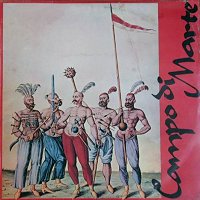 Good and very varied Italian progressive. You could almost say that each track on this album has a style of its own. It opens with "Primo Tempo" and this is not too far from what you could call heavy-progressive with it's heavy riffs, but the vocal parts are very lyric and there's also some nice flute in the middle. "Secondo Tempo" is a excellent and relaxed instrumental with flute and some great use of French horn. Very good. "Terzo Tempo" is typical Italian progressive, and it's not so much more to say about that track. "Quarto Tempo" is a instrumental with some very classical influenced organ, but the track turns into a theme from "Terzo..". My favourite track on the album is "Quinto Tempo". An almost medieval track, and when the mellotron begins it all goes straight to heaven. "Sesto Tempo" is a more rhythmic orientated track with more great French horn. "Settimo Tempo" ends the album very well with lots of atmospheric flute relived by more rocking parts. A good album that you'll surely will enjoy if you like Italian progressive rock. Good and very varied Italian progressive. You could almost say that each track on this album has a style of its own. It opens with "Primo Tempo" and this is not too far from what you could call heavy-progressive with it's heavy riffs, but the vocal parts are very lyric and there's also some nice flute in the middle. "Secondo Tempo" is a excellent and relaxed instrumental with flute and some great use of French horn. Very good. "Terzo Tempo" is typical Italian progressive, and it's not so much more to say about that track. "Quarto Tempo" is a instrumental with some very classical influenced organ, but the track turns into a theme from "Terzo..". My favourite track on the album is "Quinto Tempo". An almost medieval track, and when the mellotron begins it all goes straight to heaven. "Sesto Tempo" is a more rhythmic orientated track with more great French horn. "Settimo Tempo" ends the album very well with lots of atmospheric flute relived by more rocking parts. A good album that you'll surely will enjoy if you like Italian progressive rock.
Canarios - "Ciclos" (Ariola 1974)
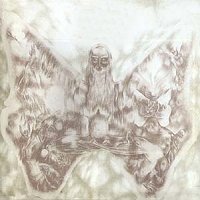 Los Canarios had something of a musical evolution. After releasing three albums of ordinary pop/rock, they decided to turn Vivaldi's famous suite "The Four Seasons" into a massive double album of progressive rock that more or less summed up everything the genre stood for. To do such a thing with one of the best known and most loved classical baroque pieces could easily have gone very wrong, but the resulting album stands for many as the magnum opus of Spanish progressive rock. The arrangements are incredibly grandiose and complex, and features everything a symphonic progressive rock fan can as for. Here's swirling Mellotrons, spacey synths, classical guitar, big choirs and several singers that ranges from everything from opera to rock. It would be too much to analyse everything they had done with the original piece, but I'll give you a few examples anyway. The suite originally opened with the probably best known theme of the piece: spring. In Los Canarios' version however, it opens with a spacey and mystical passage of atmospheric sounds that slowly builds up to the theme. It's played in a very energetic and rocking fashion that suits it surprisingly well. Other passages on the album reveal influences from other bands. One of the parts from "El Eslabon Reconbrado" sounds very much like Jade Warrior, while the use of choirs often reminds me of Latte E Miele's first album. The only unfortunate thing about "Ciclos" is that it was the final album from the band. Too bad, as they really showed they could be a first class symphonic progressive rock band here. Los Canarios had something of a musical evolution. After releasing three albums of ordinary pop/rock, they decided to turn Vivaldi's famous suite "The Four Seasons" into a massive double album of progressive rock that more or less summed up everything the genre stood for. To do such a thing with one of the best known and most loved classical baroque pieces could easily have gone very wrong, but the resulting album stands for many as the magnum opus of Spanish progressive rock. The arrangements are incredibly grandiose and complex, and features everything a symphonic progressive rock fan can as for. Here's swirling Mellotrons, spacey synths, classical guitar, big choirs and several singers that ranges from everything from opera to rock. It would be too much to analyse everything they had done with the original piece, but I'll give you a few examples anyway. The suite originally opened with the probably best known theme of the piece: spring. In Los Canarios' version however, it opens with a spacey and mystical passage of atmospheric sounds that slowly builds up to the theme. It's played in a very energetic and rocking fashion that suits it surprisingly well. Other passages on the album reveal influences from other bands. One of the parts from "El Eslabon Reconbrado" sounds very much like Jade Warrior, while the use of choirs often reminds me of Latte E Miele's first album. The only unfortunate thing about "Ciclos" is that it was the final album from the band. Too bad, as they really showed they could be a first class symphonic progressive rock band here.
Label (Dutch issue)
Capability Brown - "Voice" (Charisma 1973)
 Capability Brown were a British group that consisted of 6 members and released two albums on Charisma. "Voice" was the second of them, and is usually praised for "Circumstances" that takes up the whole of side 2. I'm almost tempted to call this the 20-minute suite that Gentle Giant never recorded, but the GG-similarities are only in the band's vocal-harmonies and in some of the medieval-influenced parts of the track. Anyway, "Circumstances" is a very complex and well-composed piece of progressive rock and it evolves all the time during the 20-minutes it lasts without loosing the continuous flow. The track varies from medieval-influenced parts with recorder and harpsichord to heavy-prog passages with aggressive guitar-riffs and then to full-blown symphonic progressive parts with Mellotron. And the band's very impressive vocal-harmonies are present all the time. Good stuff. Side 1 is less impressive and progressive, but it's still quite decent 70's rock. It opens with a version of "I Am and so are You" and some of you will also remember this track from Affinity's album. "Sad am I" is a nice and atmospheric track with a fine melody and lots of airy 12-string guitar work. "Midnight Cruiser" is on the other hand rather tedious and repetitive and stands as the album's weak spot. The humourous titled "Keep Death off the Road (Drive on the Pavement)" is a rocking track with lots of energy and joy from the band. But "Circumstances" is with no doubt the main reason for having this album. Capability Brown were a British group that consisted of 6 members and released two albums on Charisma. "Voice" was the second of them, and is usually praised for "Circumstances" that takes up the whole of side 2. I'm almost tempted to call this the 20-minute suite that Gentle Giant never recorded, but the GG-similarities are only in the band's vocal-harmonies and in some of the medieval-influenced parts of the track. Anyway, "Circumstances" is a very complex and well-composed piece of progressive rock and it evolves all the time during the 20-minutes it lasts without loosing the continuous flow. The track varies from medieval-influenced parts with recorder and harpsichord to heavy-prog passages with aggressive guitar-riffs and then to full-blown symphonic progressive parts with Mellotron. And the band's very impressive vocal-harmonies are present all the time. Good stuff. Side 1 is less impressive and progressive, but it's still quite decent 70's rock. It opens with a version of "I Am and so are You" and some of you will also remember this track from Affinity's album. "Sad am I" is a nice and atmospheric track with a fine melody and lots of airy 12-string guitar work. "Midnight Cruiser" is on the other hand rather tedious and repetitive and stands as the album's weak spot. The humourous titled "Keep Death off the Road (Drive on the Pavement)" is a rocking track with lots of energy and joy from the band. But "Circumstances" is with no doubt the main reason for having this album.
Capsicum Red - "Appunti Per Un'Idea Fissa" (Bla Bla 1972)
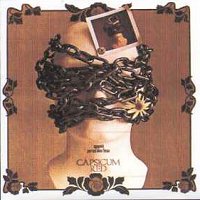 This Italian band started out as a pop-group who released a couple of awful pop-singles before they turned into a very classical/baroque-influenced progressive rock band on their first and only album. The 15-minute version of Beethoven's "Patetica" is good as a progressive rock-version of a classical piece. All the themes have been taken good care of, and they managed to create a lovely baroque atmosphere that makes me think of Ekseption. However, both this track and the rest of the album suffered from an absolutely horrendous sound-quality. The closing number was obviously an attempt at mixing their classical sound with hard rock, but the awful sound made it sound extremely limp and weak. Especially the quieter mid-part sounded as if it was about to drown completely away any minute. "Basso & Poesia" is another nice and atmospheric tune, but the sound does whatever it can to ruin this one too. Despite some listenable music, the production is so bad that I really can't recommend this album to anyone else than Italian progressive rock completists. This Italian band started out as a pop-group who released a couple of awful pop-singles before they turned into a very classical/baroque-influenced progressive rock band on their first and only album. The 15-minute version of Beethoven's "Patetica" is good as a progressive rock-version of a classical piece. All the themes have been taken good care of, and they managed to create a lovely baroque atmosphere that makes me think of Ekseption. However, both this track and the rest of the album suffered from an absolutely horrendous sound-quality. The closing number was obviously an attempt at mixing their classical sound with hard rock, but the awful sound made it sound extremely limp and weak. Especially the quieter mid-part sounded as if it was about to drown completely away any minute. "Basso & Poesia" is another nice and atmospheric tune, but the sound does whatever it can to ruin this one too. Despite some listenable music, the production is so bad that I really can't recommend this album to anyone else than Italian progressive rock completists.
Caravan - "If I Could Do It All Over Again, I'd Do It All Over You" (Decca 1970)
 One of the best and most known Canterbury bands. This was their second album and the one where the band had found their ultimate style. Jazz, pop, rock and classical music melted together in the usual progressive way, but far less pretentious than many other progressive rock bands. The classic Caravan sound was characterised by the vocals of Pye Hastings and Richard Sinclair, twisted and fuzzed organ (very typical for many Canterbury bands), and there was usually some wind instruments too, mostly flute and sax. The best tracks on the albums includes the incredible jam "For Richard" (this track is the classic Caravan sound in a nutshell) and "With an Ear to the Ground". The latter mixed excellent jams with poppy and light vocal parts, a quite typical Caravan mix. "And I Wished I Was Stoned" are another example of this. There's also some shorter and quite catchy tunes here, like "Hello, Hello" and the title-track. This is a good album and very representative for Caravan at their best. One of the best and most known Canterbury bands. This was their second album and the one where the band had found their ultimate style. Jazz, pop, rock and classical music melted together in the usual progressive way, but far less pretentious than many other progressive rock bands. The classic Caravan sound was characterised by the vocals of Pye Hastings and Richard Sinclair, twisted and fuzzed organ (very typical for many Canterbury bands), and there was usually some wind instruments too, mostly flute and sax. The best tracks on the albums includes the incredible jam "For Richard" (this track is the classic Caravan sound in a nutshell) and "With an Ear to the Ground". The latter mixed excellent jams with poppy and light vocal parts, a quite typical Caravan mix. "And I Wished I Was Stoned" are another example of this. There's also some shorter and quite catchy tunes here, like "Hello, Hello" and the title-track. This is a good album and very representative for Caravan at their best.
Caravan - "In the Land of Grey And Pink" (Deram 1971)
 Caravan's definitive masterpiece, and probably the very first Canterbury album you should check out. Side one is made up of four light and nice tracks. The best (and most progressive) of these is probably "Winter Wine". Great themes, melodies and the typical Caravan sound dominate this mellow and excellent track. "Golf Girl" is the band from their least serious side, and some trumpet and mellotron takes care of the progressive sound. "Love to Love You" is a pure and very catchy pop-track. The title-track is a mellow and nice song that fits the atmosphere of the cover quite well. However, what really makes this album essential is of course the fantastic, 22-minute "Nine Foot Underground". This incredible piece of art gets my vote as one of the ten best progressive rock tracks ever. The track is made up of the best, most inspired and energetic jams, instrumental- and vocal parts that Caravan ever have done. The excellent and distinctive organ sound comes to the fore and the track as a whole is just so perfect as it can get. An essential album in any serious progressive rock collection. Caravan's definitive masterpiece, and probably the very first Canterbury album you should check out. Side one is made up of four light and nice tracks. The best (and most progressive) of these is probably "Winter Wine". Great themes, melodies and the typical Caravan sound dominate this mellow and excellent track. "Golf Girl" is the band from their least serious side, and some trumpet and mellotron takes care of the progressive sound. "Love to Love You" is a pure and very catchy pop-track. The title-track is a mellow and nice song that fits the atmosphere of the cover quite well. However, what really makes this album essential is of course the fantastic, 22-minute "Nine Foot Underground". This incredible piece of art gets my vote as one of the ten best progressive rock tracks ever. The track is made up of the best, most inspired and energetic jams, instrumental- and vocal parts that Caravan ever have done. The excellent and distinctive organ sound comes to the fore and the track as a whole is just so perfect as it can get. An essential album in any serious progressive rock collection.
Caravan - "Waterloo Lily" (Deram 1972)
 Keyboardist Dave Sinclair had left the band and was replaced by Steve Miller, a guy who obviously preferred el-piano instead of organ. The music on this album turned into a much more jazz-influenced direction, and to be honest, I don't think a thin and farty el-piano (I've never been a big fan of that instrument) is a substitute for the powerful organ. However, the album is ok but much weaker than the two previous albums. A lot of the classic Caravan sound was gone too. But the album includes the 12-minute suite "The Love In Your Eye". It's even some orchestration here, giving the track a symphonic feel. But the jams are definitively not the same without the organ. "Nothing At All" is a jazzy jam dominated by saxes and a catchy bass-line. The title-track and "Aristocracy" is a little bit more typical Caravan with a poppy edge. Not a bad album but I wouldn't call it essential either. Keyboardist Dave Sinclair had left the band and was replaced by Steve Miller, a guy who obviously preferred el-piano instead of organ. The music on this album turned into a much more jazz-influenced direction, and to be honest, I don't think a thin and farty el-piano (I've never been a big fan of that instrument) is a substitute for the powerful organ. However, the album is ok but much weaker than the two previous albums. A lot of the classic Caravan sound was gone too. But the album includes the 12-minute suite "The Love In Your Eye". It's even some orchestration here, giving the track a symphonic feel. But the jams are definitively not the same without the organ. "Nothing At All" is a jazzy jam dominated by saxes and a catchy bass-line. The title-track and "Aristocracy" is a little bit more typical Caravan with a poppy edge. Not a bad album but I wouldn't call it essential either.
Caravan - "For Girls Who Grow Plump In the Night" (Deram 1973)
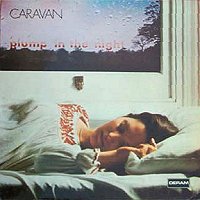 In my ears, a much better album than "Waterloo Lily". Most of the el-piano and the jazz-influences were gone, and the band had added both synths and violin to their sound. Personally I think this worked very well. The album starts with the excellent "Memory Lain, Hugh Headloss". A energetic and very catchy track with an excellent horn-arrangement in the middle. "The Dog, The Dog, He's At It Again" is a good example of the more poppy side of Caravan's progressive rock sound. The last track on the album is the great instrumental "A-Hunting We Shall Go". The riffs and themes are great, and there's also some very tasteful synths and orchestration here. I've heard that a part of this track is based on some stuff from Soft Machine's third album, but I must admit that I can't hear what part this should be. Anyway, great track! And as on all other Caravan albums there are also some short and catchy tracks here, like "Hoedown" and "Surprise, Surprise". A great album, but you should still start with "In the Land of Grey and Pink" if you aren't familiar with Caravan yet. In my ears, a much better album than "Waterloo Lily". Most of the el-piano and the jazz-influences were gone, and the band had added both synths and violin to their sound. Personally I think this worked very well. The album starts with the excellent "Memory Lain, Hugh Headloss". A energetic and very catchy track with an excellent horn-arrangement in the middle. "The Dog, The Dog, He's At It Again" is a good example of the more poppy side of Caravan's progressive rock sound. The last track on the album is the great instrumental "A-Hunting We Shall Go". The riffs and themes are great, and there's also some very tasteful synths and orchestration here. I've heard that a part of this track is based on some stuff from Soft Machine's third album, but I must admit that I can't hear what part this should be. Anyway, great track! And as on all other Caravan albums there are also some short and catchy tracks here, like "Hoedown" and "Surprise, Surprise". A great album, but you should still start with "In the Land of Grey and Pink" if you aren't familiar with Caravan yet.
Carmen - "Fandangos in Space" (Regal Zonophone 1973)
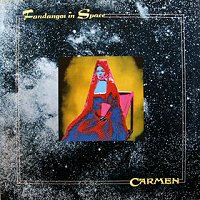 This British group was possibly one of the most original progressive rock bands you'll ever hear. Their music combined progressive rock with a strong flamenco-influence and it was all performed in a very fresh, energetic and powerful way. The instrumentation included vibes, castanets and lots of flamenco dancing! Keyboards are limited to some Mellotron and a spacey synth here and there. "Fandangos..." is to my knowledge their first album and maybe their best. It's hard to point out any highlights here, because this is a very even album. But excellent examples of their flamenco-prog includes "Bulerias", "Bullfight", "Looking Outside (My Window)" and the title-track. There are also some shorter and less progressive tracks here, like the beautiful, acoustic "Lonely House" and the catchy "Stepping Stone". Vocals are great (both male and some female) and the harmonies are gorgeous. Overall, this is a very tasty and highly unique album that should be in any progressive rock fans' collection. This British group was possibly one of the most original progressive rock bands you'll ever hear. Their music combined progressive rock with a strong flamenco-influence and it was all performed in a very fresh, energetic and powerful way. The instrumentation included vibes, castanets and lots of flamenco dancing! Keyboards are limited to some Mellotron and a spacey synth here and there. "Fandangos..." is to my knowledge their first album and maybe their best. It's hard to point out any highlights here, because this is a very even album. But excellent examples of their flamenco-prog includes "Bulerias", "Bullfight", "Looking Outside (My Window)" and the title-track. There are also some shorter and less progressive tracks here, like the beautiful, acoustic "Lonely House" and the catchy "Stepping Stone". Vocals are great (both male and some female) and the harmonies are gorgeous. Overall, this is a very tasty and highly unique album that should be in any progressive rock fans' collection.
Carmen - "Dancing on a Cold Wind" (Regal Zonophone 1975)
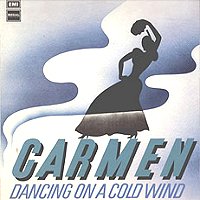 The second album opens with a fantastic track called "Viva Mi Sevilla". The vocal-part features some references to the track "Bulerias" from the first album. After the vocals, the track goes into a bunch of instrumental-passages and ends with a beautiful synth/vibe theme that builds up to an incredible powerful finale! "Purple Flowers" includes some very heavy bass (by the way, the bass player was John Glascock who later joined Jethro Tull) and the usual flamenco-influences in the middle of the track. "Drifting Along" and "She Flew Across the Room" are both more laidback, acoustic tracks that floats into each other. "I've Been Crying" sounds to me almost like a flamenco version of Curved Air. The second side of the album consists of the 24-minute "Rememberances". Very vocal-orientated with few instrumental parts, but the themes and melodies are really nice. A very good album, but personally I still like "Fandangos..." a tad more. The second album opens with a fantastic track called "Viva Mi Sevilla". The vocal-part features some references to the track "Bulerias" from the first album. After the vocals, the track goes into a bunch of instrumental-passages and ends with a beautiful synth/vibe theme that builds up to an incredible powerful finale! "Purple Flowers" includes some very heavy bass (by the way, the bass player was John Glascock who later joined Jethro Tull) and the usual flamenco-influences in the middle of the track. "Drifting Along" and "She Flew Across the Room" are both more laidback, acoustic tracks that floats into each other. "I've Been Crying" sounds to me almost like a flamenco version of Curved Air. The second side of the album consists of the 24-minute "Rememberances". Very vocal-orientated with few instrumental parts, but the themes and melodies are really nice. A very good album, but personally I still like "Fandangos..." a tad more.
Carpe Diem - "En Regardant Passer Le Temps" (Crypto 1975)
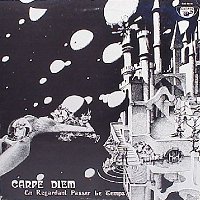 I really don't understand why this French band always gets compared with Gong. First of all, they didn't sound like Gong at all, and they were also far better, more melodic and structured than anything of Gong's childish and tedious nonsense. Their musical style can be described as jazzy symphonic progressive space-rock. The band used flutes, saxophones and some spacey and symphonic keyboards to create a sound of their own. The album opens with a short jam called "Voyage Du Non-Retour" but the other three tracks are very structured with well-written themes. The 12-minute "Rčincarnation" features some of the most beautiful parts on the album, while "Jeux Du Sičcle" undoubtedly is the most complex track here, and you'll have to hear it many times before you really gets familiar with it. The closing-number "Publiphobie" was the track that I most immediately felt for when I heard the album for the first time. But the whole album reveals itself as a masterful work after repeated listens. "En Regardant Passer Le Temps" is an impressive debut, and with no doubt the best of Carpe Diem's two releases. I really don't understand why this French band always gets compared with Gong. First of all, they didn't sound like Gong at all, and they were also far better, more melodic and structured than anything of Gong's childish and tedious nonsense. Their musical style can be described as jazzy symphonic progressive space-rock. The band used flutes, saxophones and some spacey and symphonic keyboards to create a sound of their own. The album opens with a short jam called "Voyage Du Non-Retour" but the other three tracks are very structured with well-written themes. The 12-minute "Rčincarnation" features some of the most beautiful parts on the album, while "Jeux Du Sičcle" undoubtedly is the most complex track here, and you'll have to hear it many times before you really gets familiar with it. The closing-number "Publiphobie" was the track that I most immediately felt for when I heard the album for the first time. But the whole album reveals itself as a masterful work after repeated listens. "En Regardant Passer Le Temps" is an impressive debut, and with no doubt the best of Carpe Diem's two releases.
Next Page
 |